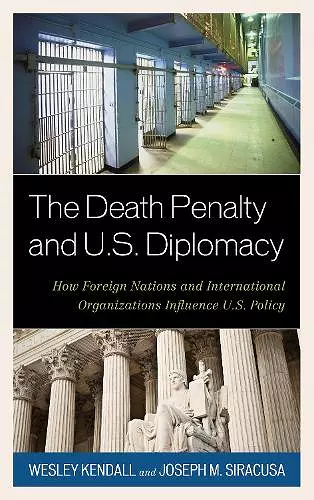The Death Penalty and U.S. Diplomacy
How Foreign Nations and International Organizations Influence U.S. Policy
Joseph M Siracusa author Wesley Kendall author
Format:Hardback
Publisher:Rowman & Littlefield
Published:12th Sep '13
Currently unavailable, and unfortunately no date known when it will be back

This unique book examines how U.S. domestic policy regarding the death penalty has been influenced by international pressures, in particular, by foreign nations and international organizations. International pressure has mounted against America’s use of the death penalty, straining diplomatic ties. U.S. policies that endorse the execution of juveniles, the mentally handicapped, and disadvantaged foreign nationals have been recognized by allied nations and international organizations as human rights abuses and violation of international law. Further, organizations such as the United Nations and Amnesty International have issued scathing reports revealing racial bias and fundamental procedural flaws in almost every phase of the judicial process in capital cases. International pressures directed at governmental entities, in particular specific states such as Texas, can have a profound impact on governmental operational efficiency and public opinion and effectively render capital punishment cost-prohibitive from a public policy standpoint. The Death Penalty and U.S. Diplomacy analyzes the institutional response to specific forms of foreign intervention and influence such as consular intervention, international litigation, and extradition negotiation. This is documented through case studies such as how a judge in Texas v. Green turned to a comparative Delaware case that relied on the Vienna Convention to remove the death penalty as possible punishment, and how Mexico pressured the White House in two separate cases. By demonstrating that foreign actors have done much to constrain the United States to abandon its policies of executing foreigners, as well as its own citizens, the book explores the foreign dimensions of the U.S. death penalty while advancing the debate surrounding the viability of this controversial policy.
Kendall and Siracusa’s study is a unique contribution to our understanding of death penalty policy in the United States and, more specifically, the role of international actors in influencing that policy. . . . One can sense the respective expertise and backgrounds of Kendall and Siracusa in the text. . . . [T]he series of detailed case studies presented by the authors gives the reader concrete and detailed insight into the influence of specific international actors at a variety of levels of the judicial and policy processes. Such details are the greatest strength of the study. Taken together, they offer fascinating and sometimes surprising insight into the sheer number and varied nature of international interventions into U.S. death penalty policy and practice, in defense of both individuals and broader laws, norms and principles. Such interventions will be of great interest not only to scholars of death penalty policy and practice, but also to scholars of international relations and U.S. foreign policy more broadly. * Australian Journal of Human Rights *
Historians have paid little attention to how the U.S.’s death penalty policy is linked to the nation’s diplomacy. Multiple issues arise when a foreign national is entangled in the American legal process or in the diplomatic battle over extradition. Since most other nations have outlawed the death penalty, Washington often finds it necessary to take the death penalty off the table when seeking extradition of a foreign national. This book enjoys exceptionally thorough research, visits all aspects of the issue in well-organized chapters, and benefits immensely from the partnership of an accomplished scholar of American criminal and international law and a distinguished historian of American foreign affairs. -- Richard Dean Burns
At a time when United States death penalty policy is increasingly out of step with global opinion and international law, Kendall and Siracusa have produced an inspired study of the foreign policy dimensions of death penalty policy. The book not only reveals new dimensions of death penalty policy and politics, but is a groundbreaking study of the global-local nexus. It’s conclusions regarding institutional responsiveness to specific forms of foreign intervention and influence have a significance that goes well beyond this specific policy issue. -- Jason Flanagan, Assistant Professor International Studies, University of Canberra, Australia
ISBN: 9781442224346
Dimensions: 236mm x 157mm x 21mm
Weight: 454g
226 pages